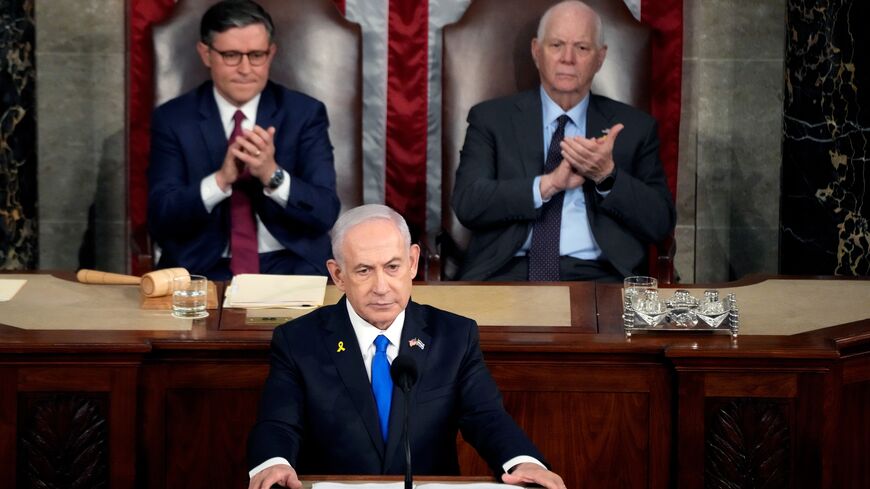House passes bill to force Biden to lift bomb shipment pause to Israel
A bill that would mandate sending military aid to Israel passed with the support of 16 Democrats, but Biden is expected to veto it.

With the help of a handful of Democrats, House Republicans passed legislation Thursday that would force President Joe Biden to send congressionally approved weapons transfers to Israel.
The House voted 224-187 in passing the bill brought by Republicans in response to Biden’s warning to Israeli Prime Minister Benjamin Netanyahu that the United States would withhold weapons if Israel launches a major military operation in Rafah.
“The Biden administration is defying the will of Congress and withholding weapons shipments to Israel,” House Speaker Mike Johnson said Thursday, citing strong bipartisan support for the supplemental spending bill — with $26 billion for Israel and aid for Gaza — that Biden signed into law last month.
House Democratic leaders whipped against the bill, while White House officials made calls to a contingent of Democrats confused about Biden’s weapons policy toward Israel. In the end, 16 Democrats crossed party lines to vote in support of the measure, a relatively small number of defectors indicating that, for now, the caucus remains largely united in support of the president’s determination when it comes to arms shipments to Israel.
Democrats had cast the bill as unserious and called it political backlash to the Biden administration pausing a shipment of 3,500 unguided bombs to Israel (approved by Congress in 2021). Senate Majority Leader Chuck Schumer has signaled that he does not plan to put the House-passed bill on the Senate floor. The draft companion bill, from Sen. Tom Cotton (R-Ark.), faces little to no chance of making headway in the Democrat-controlled Senate.
The White House amped up its effort to assure Congress this week that the vast majority of weapons for Israel were moving through the usual channels uninterrupted.
The administration told lawmakers Tuesday that it was sending a $1 billion package to Israel with mortar rounds, tank ammunition and tactical vehicles.
“We have paused only one shipment. That includes 2,000-pound bombs, which can be very destructive in densely populated urban environments such as Rafah,” White House press secretary Karine Jean-Pierre told reporters on Monday.
In an attempt to turn down the temperature on the weapons delivery debate, US national security adviser Jake Sullivan said the administration would send out every dollar approved by Congress.
“We are continuing to send military assistance, and we will ensure that Israel receives the full amount provided in the supplemental,” he told reporters Monday.
But Sullivan also left the door open for the president to use weapons shipments as leverage to pressure Israel to prioritize the safety of Gaza's civilians.
“We still believe it is, would be, a mistake to launch a major military operation into the heart of Rafah that would put huge numbers of civilians at risk without a clear strategic gain. The president was clear that he would not supply certain offensive weapons for such an operation, were it to occur. It has not yet occurred,” Sullivan said.
Secretary of State Antony Blinken, likewise, said this week that the United States continues to seek a “credible plan” from Israel to protect some 1.4 million civilians in Rafah.
‘Unintended consequences’
Biden plans to veto any version of the House-passed legislation that lands on his desk.
The bill mandates “expeditious delivery” of congressionally approved arms transfers to Israel, including the recently paused 3,500-bomb shipment. It also threatens to freeze funding for the National Security Council and for offices of the State and Defense secretaries if weapons are withheld from Israel.
The White House warned the bill was a “misguided reaction” to the administration’s weapons policy for Israel and that it could undermine Biden’s constitutional authority to execute foreign policy.
“This bill, if enacted, could lead to spiraling unintended consequences, prohibiting the United States from adjusting our security assistance posture with respect to Israel in any way, including to address unanticipated emergent needs, even if Israel and the United States agree that military needs have changed and supplies should change accordingly,” the White House said in a statement of administration policy.
But even if it will never meet Biden’s pen, the bill nonetheless served this week as a barometer for the current climate in Washington on Israel’s war with Hamas. Seven months into the conflict and with an escalating humanitarian crisis in Gaza, Biden is facing divergent pressures from within the Democratic Party to unconditionally fund Israel’s army and shield Palestinian civilians from Israeli offensives made possible in part by US arms.
More progressive Democratic lawmakers and voters accuse his administration of being complicit in Israel’s alleged crimes against humanity in Gaza. A recent State Department report found that it was “reasonable to assess” that Israel has used US-provided weapons in violation of international humanitarian law.
And Washington isn’t alone with its widening schism over the war. According to the latest report from Rina Bassist and Adam Lucente, there are signs of a deepening divide within the Israeli government, as members of Netanyahu’s cabinet question his lack of planning for postwar governance of Gaza.
But Netanyahu appears undeterred in his plans to carry out Israel’s deepening offensive in Rafah. He told CNBC in an interview Wednesday that regardless of US concerns, “ultimately we do what we have to do to protect the life of our nation.”
Pressure builds ahead of November
Biden won over the Democrats he needed in the House this round. But as the November election nears and Johnson continues to put Democrat-dividing bills to a vote, the White House could struggle to retain support. Pressuring Israel to prioritize minimizing civilian casualties in Gaza through withholding weapons shipments could prove to be too controversial a step to support for lawmakers in competitive districts who are worried about being labeled anti-Israel.
There are a few dozen Democrats the White House is watching more closely. They are all signatories to a May 10 letter pressuring Biden to release the recently paused shipment of bombs.
“With democracy under assault around the world, we cannot undermine our ally Israel, especially in her greatest hour of need. America’s commitments must always be ironclad,” 26 Democrats said in the letter.
Sullivan offered a definition of “ironclad” this week that it appears the majority of Democrats believe Biden is still sticking to. “Ironclad doesn’t mean you never disagree. It means you work through your disagreements, as only true friends can do,” the national security adviser said Monday.
Republicans, meanwhile, will continue to bear down hard on Biden’s policies on the war as the election approaches. A House panel is investigating Biden's threat to withhold military aid from Israel, demanding a briefing from Sullivan and records demonstrating “legal justification for withholding essential supplies from Israel.”
House Foreign Affairs Chairman Michael McCaul (R-Texas) and Senate Foreign Relations ranking member Jim Risch (R-Idaho) wrote to Biden this week accusing his administration of selectively classifying and declassifying information on Israeli arms shipments “for political purposes while simultaneously obscuring congressional oversight.”
The two top Republicans said Biden’s recent “de facto conditioning of our assistance” is clearly in contradiction with bipartisan support for funding Israel’s defense.
And a small group of Republicans are pushing to impeach Biden for pausing the shipment of 3,500 bombs. However, the resolution alleging abuse of power by the president has so far garnered no support from GOP leaders.






